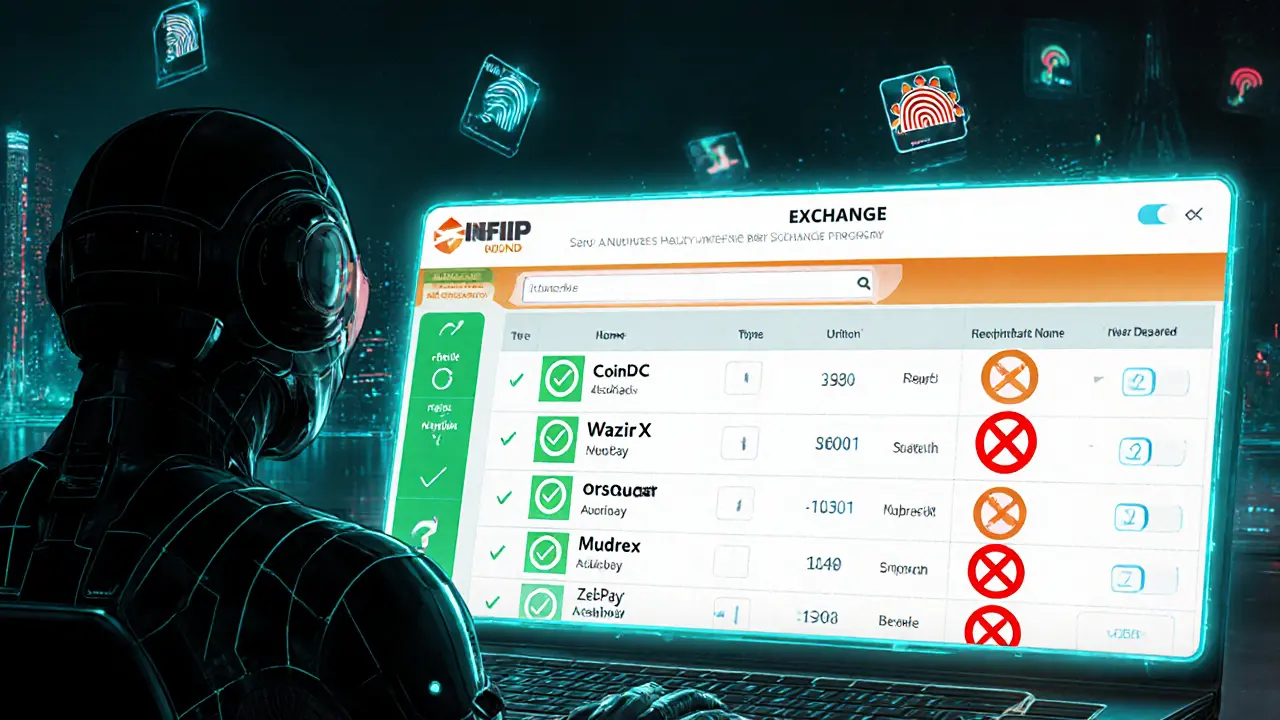When the Financial Intelligence Unit-India (FIU-IND) the government watchdog that now controls every crypto trading venue in the country started blocking non‑registered platforms in early 2024, Indian traders were forced to pick up the pieces. The result? A clear, government‑approved list of crypto exchanges banned in India foreign or domestic platforms that failed to register with the FIU‑IND and therefore cannot legally accept Indian rupees. This article tells you exactly which exchanges are on the blacklist, why they were shut down, and what you can do to keep your crypto safe.
Key Takeaways
- All exchanges must be FIU‑IND registered to operate legally in India.
- As of October2025, the most prominent banned platforms include Binance, KuCoin, Coinbase, and Bybit.
- Domestic platforms such as CoinDCX and WazirX are fully compliant and see massive user inflows.
- Using a banned exchange can lead to frozen funds, banking blocks, and possible tax penalties.
- Check an exchange’s FIU registration number on the official portal before depositing INR.
Why India Cracked Down on Crypto Exchanges
The crackdown traces back to the Reserve Bank of India (RBI) India’s central bank, which issued the 2018 circular prohibiting banks from dealing with virtual currencies. While the Supreme Court later struck down the blanket ban, the government kept a tight grip on the *exchange* layer. In February2025, Section285BAA of the Finance Bill mandated that every crypto platform serving Indian residents must register with the FIU‑IND, maintain six‑year transaction archives, and file detailed reports. Failure to comply triggers website blocking, banking bans, and investigations by the Enforcement Directorate.
List of Exchanges Currently Banned (Jan2024-Oct2025)
| Exchange | Origin | Ban Reason | Legal Status in India |
|---|---|---|---|
| Binance world’s largest crypto exchange by volume | International (Cayman Islands) | No FIU‑IND registration; unpaid penalties | Banned - INR deposits blocked |
| KuCoin popular for alt‑coin listings | International (Seychelles) | Failed to file transaction reports | Banned - website inaccessible in India |
| Coinbase US‑based exchange known for compliance tools | International (USA) | Pending FIU registration, data‑retention gaps | Banned - no Indian bank tie‑ups |
| Bybit derivatives‑focused platform | International (British Virgin Islands) | Unpaid compliance fines, AML concerns | Banned - trading API shut down |
| Bitfinex | International (British Virgin Islands) | Repeated AML violations, no FIU filing | Banned - user accounts frozen |
| Kraken | International (USA) | Did not submit FIU registration by deadline | Banned - fiat on‑ramps disabled |
These six exchanges represent the most visible offenders, but the FIU‑IND has issued enforcement notices to dozens of smaller platforms that also lack registration. If a site’s URL suddenly redirects to a government warning page, it’s almost certainly on the banned list.
Legal, FIU‑Registered Exchanges That Indians Can Use
Domestic platforms rushed to fill the void. The biggest FIU‑compliant names include:
- CoinDCX offers over 300 coins, 2,000% deposit growth in 2024
- WazirX backed by Binance’s Indian arm, fully FIU‑registered
- Mudrex focuses on crypto‑powered investment strategies
- ZebPay, Unocoin, CoinSwitch, and BuyUcoin also hold valid registration numbers.
These exchanges enjoy uninterrupted INR deposit/withdrawal pipelines, integrated KYC/AML, and automatic tax‑report generation that aligns with the 31.2% flat tax rate imposed by the Indian Income Tax Act.

How to Verify an Exchange’s FIU Registration
- Visit the official FIU‑IND registry (the URL is public and searchable).
- Enter the exchange’s name or registration number. A valid entry will display the entity’s name, registration date, and compliance status.
- Cross‑check the KYC process. Legitimate platforms will require Aadhaar, PAN, and a live video selfie.
- Confirm that the exchange offers a domestic INR bank account or UPI link. Banned platforms cannot provide these services.
- Look for a clear data‑retention policy (up to six years) in the “Legal” or “Compliance” section of the site.
Any exchange that fails one of these checks should be avoided. Even if an international platform promises “global access,” without FIU registration it will be inaccessible to Indian users.
Risks of Trading on Banned Platforms
Using a black‑listed exchange can lead to three major problems:
- Frozen Funds: Indian banks are instructed to block any INR transfers to unregistered entities, meaning deposits can be seized and withdrawals halted.
- Legal Exposure: The Enforcement Directorate can initiate money‑laundering probes if large, unreported crypto movements are detected on a non‑compliant platform.
- Tax Complications: Since banned exchanges do not issue the required Form16‑style tax statements, you must manually calculate gains. Errors can trigger up to 60% penalties under Section158BA(7).
In short, the convenience of a foreign exchange rarely outweighs the security of a FIU‑registered one.
Practical Steps for Indian Crypto Traders
If you’re still on a banned platform, follow this quick migration plan:
- Withdraw All INR: Move any fiat balance to your linked bank account before the exchange blocks further transfers.
- Transfer Crypto to a Compliant Wallet: Use a personal hardware wallet (e.g., Ledger or Trezor) to hold your assets during the switch.
- Open an Account on a FIU‑Registered Exchange: Complete KYC, link your UPI, and test a small deposit.
- Deposit Crypto: Send your assets from the hardware wallet to the new exchange’s deposit address.
- Generate Tax Reports: Most compliant exchanges now provide downloadable CSVs that match the 31.2% flat tax calculations.
- Delete the Old Account: Remove personal data from the banned platform to reduce exposure.
By the end of the week, you should be fully operational on a legal platform with no risk of frozen funds.
Future Outlook - Will More Exchanges Return?
International giants are still courting the Indian market. Binance announced a $5million compliance fund to meet FIU requirements, while Coinbase plans to launch an Indian subsidiary once it finalizes its data‑retention framework. However, the regulator’s stance remains firm: any exchange that bypasses registration will face immediate blockage. Traders should keep an eye on FIU press releases and treat any “re‑opening” announcements with caution until the official registration number is published.

Frequently Asked Questions
Which crypto exchanges are currently banned in India?
As of October2025, Binance, KuCoin, Coinbase, Bybit, Bitfinex, and Kraken are officially blocked for lacking FIU‑IND registration. The FIU’s public registry lists additional smaller platforms that also face enforcement.
How can I verify if an exchange is FIU‑registered?
Visit the FIU‑IND’s online registry, search by the exchange’s name or registration number, and look for a “Compliant” status. Also confirm that the platform offers INR‑based deposits via UPI or bank transfer.
What happens to my funds if I keep using a banned exchange?
Indian banks will block any INR transfers, and the Enforcement Directorate can freeze your accounts for alleged money‑laundering. You may also face heavy tax penalties for unreported gains.
Can I still trade on foreign exchanges using a VPN?
Technically a VPN can mask your IP, but Indian banks and payment gateways still enforce FIU rules. Any INR deposit will be rejected, and using a VPN does not protect you from legal scrutiny.
What is the tax rate on crypto gains in India?
A flat 31.2% tax applies to all crypto profits, with no set‑offs. Failure to disclose gains can attract penalties up to 60% of the undisclosed amount under Section158BA(7).





Comments
20 Comments
Prabhleen Bhatti
Okay, but let’s be real-this isn’t about regulation, it’s about control. The FIU’s crackdown feels less like financial safety and more like a power grab. I’ve been using CoinDCX since 2023, and yes, KYC is brutal, but at least my taxes are automated. Still, I miss KuCoin’s altcoins. Why can’t we have both? Why must compliance mean censorship? It’s like they want us to trade only in white bread when the world’s eating sourdough.
Elizabeth Mitchell
Just switched to WazirX last week. Took me 3 days to get KYC approved, but at least I can actually withdraw INR now. No drama. No frozen funds. No panic.
Chris Houser
As a Nigerian who’s watched this unfold, I see parallels with our own crypto crackdowns. Governments fear what they don’t understand. But blocking access doesn’t stop people-it just pushes them underground. The real win? Platforms that adapt. CoinDCX and WazirX are proof that compliance isn’t death-it’s evolution.
William Burns
One must question the intellectual integrity of a regulatory framework that permits domestic platforms to operate under the same legal umbrella as entities that have demonstrably failed to meet international AML standards. The FIU’s criteria are not merely procedural-they are existential. To equate CoinDCX’s compliance with Binance’s alleged negligence is a category error of monumental proportions.
Ashley Cecil
It’s appalling that anyone still considers using a VPN to bypass these restrictions. You’re not ‘staying safe’-you’re enabling financial crime. The 31.2% tax isn’t punitive-it’s a necessary deterrent. If you can’t follow the rules, you don’t deserve to participate.
John E Owren
Been on Binance since 2021. Still can’t believe they got banned. I’ve never had an issue with them. The Indian government’s obsession with control is more dangerous than any crypto scam. They’re not protecting users-they’re protecting banks. And banks don’t want competition.
Joseph Eckelkamp
Let me get this straight: Binance gets banned for not registering, but CoinDCX gets a gold star for being… Indian? The irony is thick enough to spread on toast. Meanwhile, the FIU’s registry has a 404 error on the ‘compliance status’ column. And we’re supposed to trust this? 😏 Also, 31.2% tax? That’s not a tax-it’s a confiscation. Welcome to the future of financial authoritarianism.
Jennifer Rosada
Anyone who still uses a banned exchange is either naive or complicit. You’re not a ‘crypto freedom fighter’-you’re a tax evader waiting for a notice from the ED. The fact that people still defend these platforms shows how dangerously romanticized crypto has become. Reality check: your ‘assets’ are just lines of code on a server you don’t control.
adam pop
FIU? More like FBI. This is all a setup. The government is using crypto as an excuse to track every rupee you spend. Next thing you know, your UPI will be monitored for ‘suspicious spending patterns.’ They’re building a digital ID prison-and you’re handing them the keys by using WazirX.
Dimitri Breiner
People are acting like this is the end of crypto in India. It’s not. It’s the beginning of a smarter, more regulated market. The platforms that survived-CoinDCX, WazirX, ZebPay-they’re the ones building infrastructure for real adoption. The banned ones? They were casinos with blockchain branding. This is a cleanup, not a crackdown.
LeAnn Dolly-Powell
Just got my first tax report from CoinDCX! 🎉 So easy. I was nervous, but the CSV file literally had everything-buy/sell dates, gains, even the tax calc. Felt like a grown-up filing taxes for once. Also, my mom finally gets why I’m not ‘gambling’ anymore. 🥹
Anastasia Alamanou
Let’s not forget the human cost here. Thousands of Indian retail traders lost access to their assets overnight. The FIU didn’t give grace periods, didn’t warn, didn’t educate-they just pulled the plug. Compliance is good, yes-but authoritarianism dressed as regulation? That’s not innovation. That’s intimidation. And the fact that we’re celebrating CoinDCX as a hero? That’s the real tragedy.
Rohit Sreenath
You think you’re safe on WazirX? Think again. They are owned by Binance. The same people. The same code. The same lies. The government knows this. But they let it happen because they need to show ‘action’. You are not free. You are being managed.
Sam Kessler
FIU registration? Please. The entire system is a shell game. The ‘registry’ is a static HTML page hosted on a government server with no API, no verification logs, no transparency. How can you trust a ‘compliance’ system that doesn’t even allow machine-readable validation? This isn’t regulation-it’s theater. And you’re the audience paying for the tickets.
Steve Roberts
Wait-Coinbase is banned? But they’re the most compliant exchange in the world. How? They have a whole legal team in DC. The real story here isn’t India’s crackdown-it’s that even the most regulated platforms can’t navigate this mess. So why are we blaming users? The system is broken. Not the traders.
John Dixon
Oh, so now it’s ‘safe’ to use WazirX because they’re ‘compliant’? And you think that means your data isn’t being sold to the highest bidder? Please. The government isn’t your guardian-it’s your landlord. And now you’re paying rent in your own crypto.
Brody Dixon
I moved my funds last month. Took me two weeks to get used to the UI on ZebPay. But I sleep better now. No stress. No fear of a bank freeze. I don’t need to trade on 100 altcoins to feel alive. Just keeping my BTC and ETH in one place that won’t vanish tomorrow? That’s peace of mind.
Mike Kimberly
Let’s zoom out. India’s crypto regulation isn’t about fear of decentralization-it’s about preserving monetary sovereignty in a world where digital currencies are reshaping global finance. The RBI and FIU aren’t anti-innovation; they’re pro-stability. The fact that domestic exchanges like CoinDCX have seen 2000% growth proves that innovation thrives under structure. Compare that to the Wild West of unregulated offshore platforms, where users lost millions to rug pulls and exit scams. This isn’t censorship-it’s maturation. And yes, the tax is steep, but it’s transparent. You know exactly what you owe. No hidden fees. No shell companies. No anonymity. That’s the price of legitimacy in a modern economy. The real question isn’t whether this is fair-it’s whether you’re ready to grow up and trade like an adult, not a gambler hiding behind a VPN.
Sarah Hannay
Thank you for the clarity. As someone who’s watched this unfold from abroad, I appreciate how structured and transparent your approach is. It’s rare to see a regulatory framework that actually prioritizes user protection over political optics.
Richard Williams
Exactly. Sarah, you nailed it. This isn’t about control-it’s about creating a safe space for innovation. The fact that Indian traders are now getting automated tax reports? That’s a win. We should be celebrating that, not complaining about the rules.
Write a comment